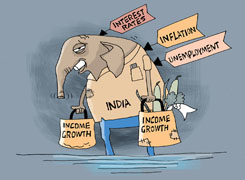I am a Railway employee, my monthly salary is approx 38000. I have a personal loan of monthly emi 17000 and it's outstanding amount 490000 about remaining 40 months. I have also invest 9000(5000 RD + 4000 MF) for my marriage in first of 2026 .
My total expenditure ={ 23000 ( including loan emi) and invest 9000 for marriage and 7000 for try to prepayment to loan }= 39000
My next plan build my house take a home loan about 15 lakh and try to prepayment my personal loan with extra emi 7000 but it takes 20 months, I want to take home loan in next year 2025 about 8 month later, so I try to close my personal loan as early as possible in each month with extra emi. But can't get the result at proper time. what should I do ? And Ami I going in right path? Pls suggest me
Ans: First, let me appreciate your dedication and forward-thinking. Managing finances can be tough, especially with loans and future plans. Your situation needs a balanced approach. Let’s dive into it.
Understanding Your Financial Landscape
You have a salary of Rs 38,000 per month. You have a personal loan EMI of Rs 17,000 with an outstanding amount of Rs 4,90,000, to be paid off in 40 months. You are investing Rs 9,000 per month for your marriage in 2026, with Rs 5,000 in a Recurring Deposit (RD) and Rs 4,000 in mutual funds. Your total monthly expenditure is Rs 39,000, including loan EMI, investment for marriage, and an additional Rs 7,000 towards prepayment of the loan. You plan to take a home loan of Rs 15 lakh in 2025. Let’s analyse and strategize your financial journey.
Loan Repayment Strategy
Assessing Current Loan Situation
Your personal loan EMI is quite high, consuming a significant portion of your income. You are prepaying Rs 7,000 monthly to close this loan early, but it is stretching your finances thin.
Benefits of Prepayment
Prepaying your loan reduces the principal amount, thereby reducing the interest burden. However, it also reduces your monthly cash flow, limiting your ability to save and invest for other goals.
Balancing Prepayment and Savings
Instead of aggressively prepaying the loan, consider a balanced approach. Allocate a portion of your extra EMI towards an emergency fund and investments. This will ensure you have a cushion for unexpected expenses and continue growing your wealth.
Investment Strategy
Mutual Funds
Mutual funds are a good choice for long-term goals. They offer diversification, professional management, and compounding benefits.
Categories of Mutual Funds
Equity Mutual Funds
Invest in stocks.
Suitable for long-term wealth creation.
Higher returns, higher risks.
Debt Mutual Funds
Invest in fixed-income securities.
Stable returns, lower risk.
Good for maintaining liquidity.
Hybrid Mutual Funds
Mix of equities and debt.
Balanced risk and returns.
Advantages of Mutual Funds
Professional Management
Fund managers make investment decisions for you, beneficial if you lack time or expertise.
Diversification
Spreading investments across various assets reduces risk.
Liquidity
Easy to redeem units, providing good liquidity.
Power of Compounding
Investing long-term lets your returns compound, significantly growing your wealth.
Actively Managed Funds vs. Index Funds
Disadvantages of Index Funds
Index funds replicate a market index, offering average market returns. They can't respond to market changes, potentially underperforming during downturns.
Benefits of Actively Managed Funds
Actively managed funds aim to outperform the market by making strategic choices. Fund managers actively buy and sell securities to leverage market opportunities, offering higher returns.
Direct Funds vs. Regular Funds
Disadvantages of Direct Funds
Direct funds require handling all investment decisions and paperwork, which can be complex and time-consuming without professional guidance.
Benefits of Regular Funds
Investing through a Certified Financial Planner (CFP) provides expert advice tailored to your goals. A CFP can help you choose the right funds, monitor your portfolio, and make adjustments as needed, optimizing returns and managing risks.
Emergency Fund
Maintain an emergency fund equal to 6-12 months of expenses. This ensures quick access to cash for unexpected expenses, providing financial security.
Home Loan Strategy
Assessing Home Loan Readiness
Planning to take a home loan of Rs 15 lakh in 2025 requires careful consideration. Ensure you have a stable income, low debt-to-income ratio, and good credit score.
Prepayment Strategy
Instead of fully prepaying your personal loan, balance between prepayment and savings. Allocate some funds towards an emergency fund and investments. This will help you manage your finances better when you take the home loan.
Home Loan EMI
Plan your home loan EMI to be affordable within your monthly budget. Ensure it doesn’t strain your finances or hinder other financial goals.
Risk Management
Understanding and managing risk is crucial.
Loan Risks
High EMIs can strain your monthly budget, limiting savings and investments. Ensure loan repayments are manageable and don’t hinder financial stability.
Investment Risks
Mutual funds come with market risks. Diversify your portfolio to manage risk effectively. Balance between equity, debt, and hybrid funds based on your risk appetite and financial goals.
Professional Guidance
Working with a Certified Financial Planner (CFP) provides personalized investment strategies. A CFP can help navigate financial markets and make informed decisions.
Final Insights
Your financial journey requires careful planning and strategic investments. Balance loan prepayment with savings and investments. Strengthen your mutual fund portfolio with a mix of equity, debt, and hybrid funds. Consider actively managed funds for higher potential returns. Invest through a CFP for expert guidance and optimized returns.
Maintain an emergency fund for financial security. Plan your home loan EMI within your budget to avoid financial strain. Regularly review and adjust your financial plans to stay on track with your goals.
By managing your loans, investments, and risks effectively, you can achieve your financial goals and build a secure future.
Best Regards,
K. Ramalingam, MBA, CFP,
Chief Financial Planner,
www.holisticinvestment.in


























